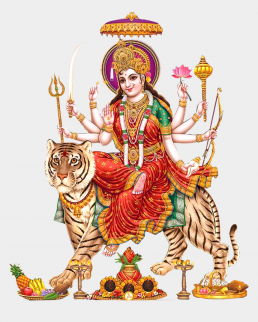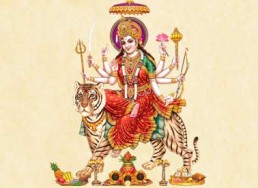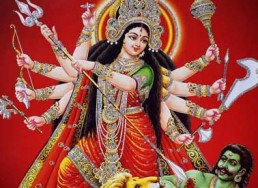Kalika Ashtakam
गलद्रक्तमुण्डावलीकण्ठमाला
महोघोररावा सुदंष्ट्रा कराला ।
विवस्त्रा श्मशानालया मुक्तकेशी
महाकालकामाकुला कालिकेयम् ॥१॥
ṃaho-ġhora-ṟāvā Su-ḍamssttrā k͟harālā |
Vivastrā ṣmaśāna-[ā]alayā ṃukta-k͟heśī
ṃahākāla-k͟hāma-[ā]akulā k͟hālikeyam ||1||
she is making a very terrific sound revealing her large teeth, and her appearance is extremely dreadful to look at,
she is without any clothes and residing in the cremation ground; her hair is let loose and free (as is her entire appearance),
her entire being is manifesting the great yearning to merge with mahakala (to take the devotees beyond samsara); she is Kalika, the great dark goddess.
वरं दक्षयुग्मेऽभयं वै तथैव ।
सुमध्याऽपि तुङ्गस्तना भारनम्रा
लसद्रक्तसृक्कद्वया सुस्मितास्या ॥२॥
Varam ḍakssa-ẏugme-ābhayam Vai ṭathai-[ā-ĕ]va |
Su-ṃadhya-āpi ṭungga-Stanā Bhāra-ṇamrā
l̤asad-ṟakta-Srkka-ḍvayā Susmita-[ā]asyā ||2||
and in like manner with her right pair of hands, she is depicting the vara (boon-giving) and abhaya (fearlessness) mudras (gestures) (assurance of taking the devotees to the world beyond death),
her well-built middle torso is slightly bent with the weight of her lofty breasts,
her pair of lips are shining with redness (the colour of blood), at the corner of which is playing a beautiful smile (of death).
लसत्प्रेतपाणिं प्रयुक्तैककाञ्ची ।
शवाकारमञ्चाधिरूढा शिवाभिश्_
चतुर्दिक्षुशब्दायमानाऽभिरेजे ॥३॥
l̤asat-Preta-Pānnim Prayuktai(a-ĕ)ka-k͟hān.cī |
ṣava-[ā]akāra-ṃan.ca-ādhi-ṟūddhā ṣivābhiś_
Catur-ḍikssu-ṣabdāyamāna-ābhireje ||3||
her shining girdle in the waist is made up of the (severed) joined hands of the dead,
she is mounted on the platform of corpses; .. and jackals …
from all four directions are making howling sounds (of terror); … and in the midst of all these is reigning Kalika, the great dark goddess.
विरञ्च्यादिदेवास्त्रयस्ते गुणास्त्रीन्
समाराध्य कालीं प्रधाना बभूबुः ।
अनादिं सुरादिं मखादिं भवादिं
स्वरूपं त्वदीयं न विन्दन्ति देवाः ॥१॥
Sama-[ā]arādhya k͟hālīm Pradhānā Babhūbuh |
ānādim Surādim ṃakhādim Bhavādim
Svarūpam ṭvadīyam ṇa Vindanti ḍevāh ||1||
and equally considering Kali as their aradhya (worshippable), have become the chief among the devas,
you are without any beginning, you are the beginning of all devas (i.e. the primordial power giving birth to the devas), you are the beginning of all sacrifices (i.e. the primordial power to which all sacrificial oblations go), you are the beginning of all the worlds (i.e. the primordial power giving birth to the worlds),
even the devas do not know your transcendental nature.
सुहृत्पोषिणीशत्रुसंहारणीयम् ।
वचस्तम्भनीयं किमुच्चाटनीयं
स्वरूपं त्वदीयं न विन्दन्ति देवाः ॥२॥
Suhrt-Possinnī-ṣatru-Samhārannīyam |
Vaca-Stambhanīyam k͟him-ūccāttanīyam
Svarūpam ṭvadīyam ṇa Vindanti ḍevāh ||2||
you are the power which nourish the good-hearted, and you are the power which destroy the enemies (i.e. evil hearted),
you are the power which can supress the speech, and what more, you are the power which can eradicate speech itself (i.e. destroy the vain pride of enemies),
even the devas do not know your transcendental nature.
मनोजास्तु कामान् यथार्थं प्रकुर्यात् ।
तथा ते कृतार्था भवन्तीति नित्यं
स्वरूपं त्वदीयं न विन्दन्ति देवाः ॥३॥
ṃano-Jāstu k͟hāmān ẏathārtham Prakuryāt |
ṭathā ṭe k͟hrtārthā Bhavanti-īti ṇityam
Svarūpam ṭvadīyam ṇa Vindanti ḍevāh ||3||
fulfill the mind-born wishes uttered with true devotion,
thus, to you the world is always grateful,
even the devas do not know your transcendental nature.
लसत्पूतचित्ते सदाविर्भवत्ते ।
जपध्यानपूजासुधाधौतपङ्का
स्वरूपं त्वदीयं न विन्दन्ति देवाः ॥४॥
l̤asat-Pūta-Citte Sada[a-ā]avirbhavat-ṭe |
Japa-ḍhyāna-Pūjā-Sudhā-ḍhauta-Pangkā
Svarūpam ṭvadīyam ṇa Vindanti ḍevāh ||4||
within the heart shining with purity, you always manifest yourself, …
the heart which is cleansed of impurities by the nectar of japa (repetition of god’s name), dhyana (meditation) and puja (worshipping god),
even the devas do not know your transcendental nature.
शरच्चन्द्रकोटिप्रभापुञ्जबिम्बम् ।
मुनीनां कवीनां हृदि द्योतयन्तं
स्वरूपं त्वदीयं न विन्दन्ति देवाः ॥५॥
ṣarac-Candra-k͟hotti-Prabhā-Pun.ja-Bimbam |
ṃunīnām k͟havīnām ḥrdi ḍyotayantam
Svarūpam ṭvadīyam ṇa Vindanti ḍevāh ||5||
your form is like the moon in the autumn sky (of spiritual consciousness) which reflects the million rays contained within it,
the sages and the enlightened feel your presence within the caves of their hearts,
even the devas do not know your transcendental nature.
कदाचिद् विचित्राकृतिर्योगमाया ।
न बाला न वृद्धा न कामातुरापि
स्वरूपं त्वदीयं न विन्दन्ति देवाः ॥६॥
k͟hadācid Vicitrā-k͟hrtir-ẏogamāyā |
ṇa Bālā ṇa Vrddhā ṇa k͟hāmātura-āpi
Svarūpam ṭvadīyam ṇa Vindanti ḍevāh ||6||
sometimes you assume various forms through your yogamaya,
you are neither a small girl, nor an old woman, and also not of any age filled with love desires (i.e. youth),
even the devas do not know your transcendental nature.
मया लोकमध्ये प्रकाशिकृतं यत् ।
तव ध्यानपूतेन चापल्यभावात्
स्वरूपं त्वदीयं न विन्दन्ति देवाः ॥७॥
ṃayā l̤oka-ṃadhye Prakāśi-k͟hrtam ẏat |
ṭava ḍhyāna-Pūtena Cāpalya-Bhāvāt
Svarūpam ṭvadīyam ṇa Vindanti ḍevāh ||7||
has been revealed by me in the midst of the world,
it has been revealed by the childlike nature (within me) which has been made pure by meditation on you,
even the devas do not know your transcendental nature.
तदा सर्वलोके विशालो भवेच्च ।
गृहे चाष्टसिद्धिर्मृते चापि मुक्तिः
स्वरूपं त्वदीयं न विन्दन्ति देवाः ॥८॥
ṭadā Sarva-l̤oke Viśālo Bhavec-Ca |
ġrhe Ca-āsstta-Siddhir-ṃrte Ca-āpi ṃuktih
Svarūpam ṭvadīyam ṇa Vindanti ḍevāh ||8||
then he will become great in all the worlds,
in the house (i.e. while living in this world) he will get the eight siddhis, and after death he will attain liberation,
even the devas do not know your transcendental nature.

Description
Composed by Sri Adi Shankaracharya on devi Kalika. The Goddess Kali is the guardian, also known as Kalika. The protectors, the Mother, Kali is Dharma and eternal time. Kali shines with the brilliance of a million black fires of dissolution and her body is bathed in the sacred ash. Kali is revered as Bhavtirine i.e the redeemer of the universe. Kali is the Goddess of time and change. Chanting the Kali Ashtakam will provide you with all the material comfort and would remove any difficulties in life.
Other Durga Shlokams
Argala Stotram
The Argala Stotram is a powerful hymn dedicated to Goddess Durga, often recited during the Chandi Path or Durga Saptashati.
Ayigiri Nandini
The Mahishasura Mardini Stotram also known popularly as Aigiri Nandini, holds immense significance during Navratri. The word Mahisha means buffalo and Asura means Rakshasa or Demon. Composed by the great sage Adi Shankaracharya around 810 AD, this…
Devi Aparadha Kshamapana Stotram
Composed by Sri Adi Shankaracharya. Aparadha Kshamapana stotram is usually recited after a recital or after the completion of Puja. Its like asking for forgiveness from Goddess for various mistakes th
Devi Suktam
Devi Suktam or the Vaak Sutam (Vak suktam) occurs in the 10th mandala of Rig Veda Samhita as suktam number 125. The seer of the mantra is vak, the daughter of rishi ambharnaa,
Durga Suktam
This is a prayer to the fire god Agni occurring in the Maha Narayana Upanishad. Section two. Agni, the Lord of Fire, symbolises the power of action.Goddess Durga symbolizes dynamism, energy, diligence
Keelaka Stotram
Rishi Markandeya tells his disciples in sixteen shlokas the ways and means of removing obstacles faced by devotees while reading Devi Mahatmya. Reading of Keelakam brings blessings of Devi, spiritual
Mahishasura Mardini Storam
Mahishasura Mardini Stotram - This is a prayer to the Goddess who killed Mahishasura. “The place where Sri Mahishasura Mardini Stotram is sung every day, I will always be present and never leave.” - The Devi’s proclamation in the 12th chapter of the…
Sarva Mangala Mangalye
Sarva Mangala Mangalye - Salutations to you O Narayani, who is the auspiciousness of all that is auspicious, the consort of Lord Shiva, who is the means of accomplishing all desires, and who is the refuge of all, the consort of the three eyed Shiva,…
Shakradaya Stuti
This famous stuti is sung by Shakra (Indra) and the other devas in praise of Durga. This is part of Chandi path which is a text about Goddess Chandi. It is also called Durga Saptashati or 700 verses r
Tantrokta Ratri Suktam
Ratri Sukta is one of the famous hymn to Goddess Durga. This in true essence praises the latent energy in Narayana and in every sadhak. Ratri Suktam is used to invoke that energy and to enhance the mi
Kalika Ashtakam – Durga – In Sanskrit with English Transliteration, Translation and Meaning. Commentary for selected Shlokams.


